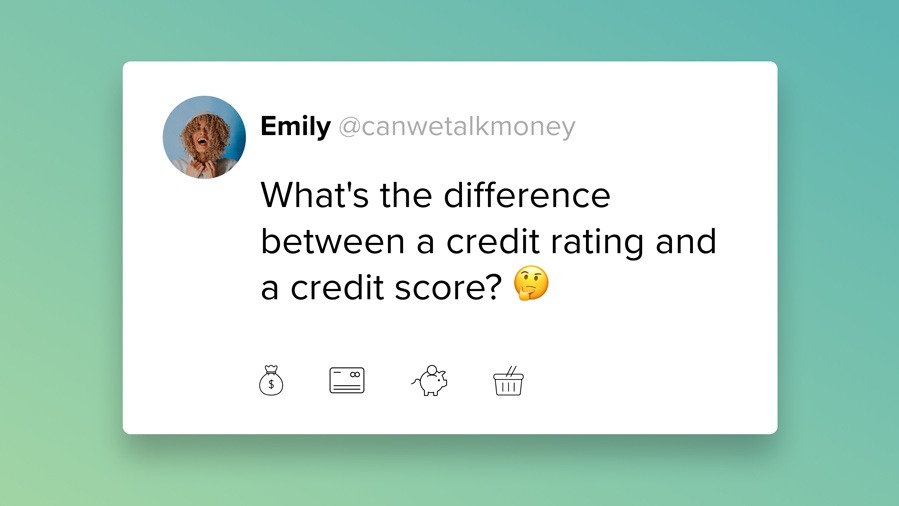

The terms credit rating and credit score are often used interchangeably but there are slight differences between them. A credit rating typically applies to businesses whereas a credit score applies to individuals.
However, credit reference agencies don’t all work the same and some may refer to a credit rating when assessing an individual’s creditworthiness. It can refer to many different systems used to assess the creditworthiness of individuals, businesses, or other organisations. Credit ratings can also refer to the grade given to countries - which usually ranges from AAA to D ratings.
Your credit rating represents your creditworthiness, and it’s an assessment of the risk associated with lending you money. Your credit rating is a key factor creditors use to determine whether to approve a loan application and what interest rate to charge.
Your credit rating may also be used by landlords, utility companies, and employers to decide things like if they will hire you and what you will pay for goods and services.
There are three major credit rating agencies in the UK: Experian, Equifax and TransUnion. They collect information on lenders’ behaviours, including how many applications they accept, how often they approve loans, how quickly they process payments, and how long they keep delinquencies on their books.
A credit score - or sometimes called a credit rating - is a number that shows how likely you are to pay your bills on time. It is calculated based on your payment history, outstanding debt balance, length of credit history, recent inquiries and type of credit used. A credit score is not based on any individual factors but rather on your overall financial history and likelihood to repay loans.
Credit ratings or credit scores vary from one person to another, even if they have the same financial history and similar incomes. This is because the agencies use different criteria in their analysis.
While a low credit rating can cost you money when applying for loans or credit cards, it can also save you money. Many insurance companies give lower premiums to people with higher credit ratings.
There is no one answer to this question as credit ratings can vary depending on the lender. However, a credit score of 700 or above is generally considered good.
A credit rating is just one factor that lenders look at when assessing credit applications. Other factors include your income, employment history and any existing debt.
If you have a low credit rating, you are considered high risk for a lender. As a result, you may pay a higher interest rate for a loan or you may not be able to get a loan at all. Credit card companies will also charge you a higher interest rate if you have a low credit rating.
You may have trouble renting an apartment or getting utilities, or you may not be able to get a job that requires a background check.
If you have a good credit rating, you're more likely to be approved for credit products with favourable terms and interest rates. This can save you a lot of money over the life of the loan.
For example, someone with a credit score of 750 could get a 30-year mortgage at an interest rate of 3.875%, while someone with a credit score of 650 would pay 5.125% – that’s a difference of more than £38,000 in interest payments over the life of the loan.
A good credit rating can also help you qualify for other types of financing, such as auto loans and business loans.
Credit ratings are determined by credit reporting agencies, which collect information about your credit history from lenders. It's important to remember that a credit rating is not static - it can change over time, both up and down.
If you have a low credit rating, it may be difficult for you to get a loan. If you have a low credit rating, you may have to pay a higher interest rate on a loan and it may also be difficult for you to get a credit card. A low credit rating can make it difficult for you to get certain jobs, like working in law enforcement - and even make it more difficult for you to rent an apartment.
There are several things you can do to improve your credit rating, including:
registering on the electoral roll
making all your credit repayments on time
paying off your debts
keeping your credit balances low
To build and maintain a good credit rating, make sure you are making your payments on time. If you cannot make a payment on time, contact your lender and try to arrange a payment plan to get current. Keep your total outstanding debt as low as possible as this will also reduce your credit utilisation rate.
Paying off debt will reduce your total outstanding debt. You can also improve your credit rating by getting a copy of your credit report and checking it for errors. If there are errors on your credit report, you can dispute them and your credit report will be updated to reflect the correction.
It's a good idea to check your credit report regularly. This will help you make sure there are no errors on it. It will also help you spot if anyone has stolen your identity.
If you find anything on your credit report that you don't understand, you can contact the credit reference agency for more information.